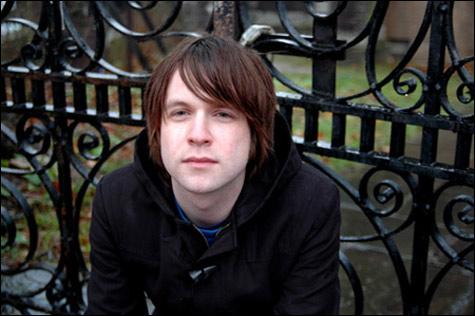
James Blackshaw |
September has seen an embarrassment of acoustic-guitar riches here in Boston, with performances by three of the world’s finest — Sir Richard Bishop, Jack Rose, and local master Glenn Jones. The parade of steel-string luminaries continues when Great Britain’s James Blackshaw comes to town for a pair of concerts, the first on September 30 opening for José González at the Paradise, the second on October 10 headlining a show at the Mills Gallery in the South End.
At the wizened age of 25, Blackshaw already has an impressive body of releases under his belt. His most recent is The Cloud of Unknowing, (title courtesy of the anonymous 14th-century English spiritual guide, one presumes), on New York’s Tompkins Square label, home to many of the heirs of ’60s folk-guitar legends John Fahey and Robbie Basho. As always, his technique is breathtaking: he glides through complex, shifting, raga-like patterns with mercurial fluidity, and even when he’s tearing through riffs at breakneck speed, his sound remains sublime, the notes shimmering and ringing like bells.

“I really didn’t pick up an acoustic guitar until maybe five years ago,” he explains over the phone from his home outside London. “I just kind of got interested in finger-picking and blues and things like that, while at the same time I started listening to experimental music. The two came together in terms of the technique that I was learning on the guitar and then combined with my interest in things like Indian music and classical music.”
These eclectic musical interests are woven through Blackshaw’s intricate compositions, which draw on Appalachian folk, roots blues, Chinese and Indian music, modern classical composition, and minimalism. He believes his instrument of choice encourages this kind of structural and melodic density. It’s not surprising, then, that his interest in the 12-string was first piqued when he heard Basho, who drew from similarly esoteric sources.
“I loved the way the instrument sounded,” he recalls of his first exposure to Basho’s otherworldly playing, “and just out of curiosity I picked it up. I didn’t expect it to become my main instrument, but something just felt right about it. The 12-string seemed to suit the kind of compositions I wanted to make, and the instrument itself sort of dictates the way I play. It became about the resonances of the instrument. If you tune the instrument a certain way and you’re playing the open strings and not actually fretting the strings too much, it sounds almost bell-like, or like a grand piano with the sustain pedal pressed down. I really liked the timbre.”
His music still centers on exploring the sonorous, crystalline aspects of the guitar, but he’ll toss the occasional gob of grit in the mix, deploying dissonance and noise in his otherwise elegant compositions. “I like noise music, but I like to incorporate it in a way that’s not so obvious. I don’t feel that noise has to be this incredibly ugly thing — that’s an old-fashioned way of looking at things.”
This fall will see the release of his collaboration with the avant-garde lute player Jozef van Wissem on the AudioMER label — you can hear a preview track on the label’s MySpace page. At the time of our conversation, he was in the midst of recording his next solo album. And though he continues to experiment, adding different instruments and textures, it will still be a solo-guitar record. “It’s what I’ve become most comfortable with,” he says of the 12-string, “but by the same token, I’m not beyond shaking that up a bit. I think on the next recording there will be some surprises for people. I’ve got a few ideas.”
SUSANNA BOLLE is the host of Rare Frequency on WZBC 90.3 FM and is one of the curators of the Non-Event Experimental Music Series.